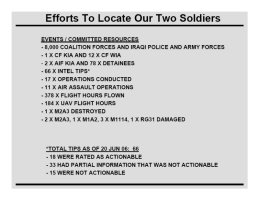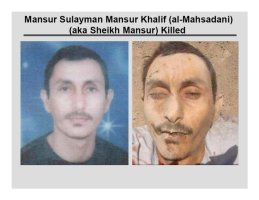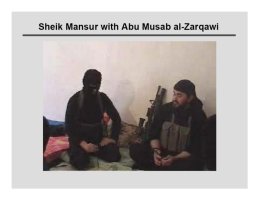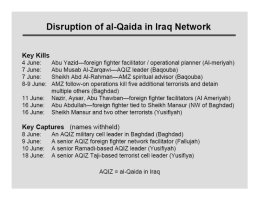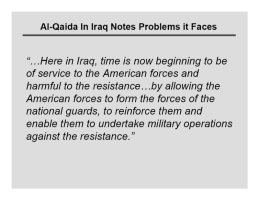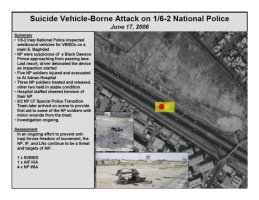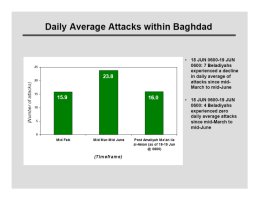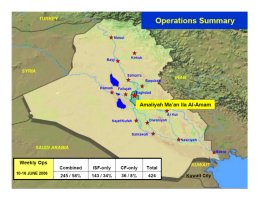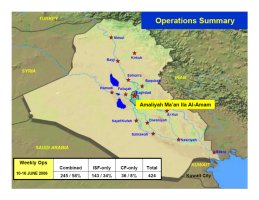
Weekly Press Briefing, June 20, 2006
Multi-National Force-Iraq
Monday, 19 June 2006
Maj. Gen. William B. Caldwell IV
Briefing by Maj. Gen. William Caldwell IV, Spokesman For Multi-National Force - Iraq
Topic: Update on Operations in Iraq, including the Search for two missing Soldiers
Location: The Combined Press Information Center, Baghdad, Iraq
Time: 8:30 A.M. EDT
Date: Tuesday June 20, 2006
GEN. CALDWELL: Good afternoon, ladies and gentlemen.
There has been press reports that have gone on this afternoon, stating that we have in fact found the remains of our two missing soldiers. What I will just say at this point is, we, as an armed force of the United States, first and foremost to those families who have either lost or have someone missing, and to them we owe our first responsibility of any reporting. It would be inappropriate and very inconsiderate for us to say anything further about the ongoing search and either confirming or denying any reports as to the status and whereabouts of either PFC Menchaca or PFC Tucker. And I would ask for everybody to please give those families the due respect and dignity they deserve in hearing any reporting first through the armed forces of the United States and not on the national media.
The search has been extremely extensive in continuing to look for our two soldiers, whose duty status and whereabouts was unknown.
First slide.
Since Friday evening on June 16th, when they turned up duty status unknown, whereabouts unknown, we have conducted extensive operations, and as we have stated before, over 8,000 coalition forces and Iraqi police and army forces involved in this search.
We have lost one coalition force member in that search and 12others wounded. And as you can see, we have killed two anti-Iraqi elements, forces and detained 78.
What's key is we did receive 66 intelligence tips, of which 18were rated as actionable. And we in fact took immediate steps and followed up on those tips.
We continue with an extensive use of all assets, from national assets to internal theater assets, in that quest to find our two missing soldiers, but it doesn't stop there.
I think everybody realizes that today we still have two other service members in addition to those two we just discussed that are listed as missing here in Iraq, and Sergeant Matt Maupin, who's been missing since April of 2004, and Captain Speicher, United States Navy. Both obviously are two that we continue to carry on the status as missing in action. There are also 11 American citizens that today are still listed as missing in action, either DOD contractors, civilian contractors or others, but American citizens that have been reported as missing over the last three years.
A great many coalition security personnel continue to study the different kidnapping techniques that are being utilized by these different anti-Iraqi elements and tactics and techniques that they use as they continue to do this. We are all very much aware of the atrocities that they commit, normally by the foreign fighters and some of the indigenous groups, with their victims that they take into their custody. It pains us to realize what fellow service members may go through and other American citizens. I can just say that our resolve is -- will continue until we find the final disposition and take the appropriate action against those who perpetrated this event.
What I'd like to do is go on and talk about these terrorist elements that continue to operate here within Iraq. They're -- in the intensity with which we continue to work at the al-Qaida network continues. We have stated before that the fact that we took out Zarqawi and decapitated the head of the outfit doesn't mean it will not have the ability to regenerate. But during that time period of which it is attempting to regenerate, it is very vulnerable and very susceptible to further attrition by us.
During this past three or four days now -- if you would, first slide -- we took out another very senior member of the al-Qaida network.
On Friday morning, Mansur Sulayman Mansur Khalif al-Mashhadani, or known as Sheikh Mansur, was killed by coalition forces in the very vicinity where we have been searching for our two missing servicemembers. Also killed with him were two other foreign fighters. One of them was a cell leader by the name of Abu Tariq. But this picture here is Sheikh Mansur, probably identified as being in the probably top five of the al-Qaida organization. Coalition forces initially targeted a vehicle upon which he and two other people were inside. They attempted to flee. Coalition forces pursued them, and during that time period engaged the vehicle and destroyed it.
We do know that Sheikh Mansur was a key leader in al-Qaida in Iraq with excellent religious, military and leadership credentials within that organization. He was tied to the senior leadership, including having relationships with both Zarqawi and with al-Masri. We do think that his death will significantly continue to impact on the ability of this organization to regenerate and reorganize itself.
Sheik Mansur was approximately 35 to 37 years old; had received religious training in Jordan sometime around -- in the mid-1990s. We had had him in our possession at one time as a captive. He was captured by the Multinational Forces in July of 2004, during which time we had attributed him to be working for Ansar al-Islam and Ansaral-Sunna as their religious emir. He joined al-Qaida in Iraq, as we understand, sometime after his release in the fall of 2004. And at the time of his death, we believe him to have been the religious emir for all of al-Qaida in Iraq. Like Abu Masri, Sheik Mansur was considered highly qualified to take Zarqawi's place due to his leadership abilities, military experience, and religious training. Mansour was a multifunctional person within the al-Qaida in Iraq network, and was involved in recruiting, leadership, and in spiritual advice.
In addition to being a top leader -- next slide -- Sheikh Mansur importantly served as a right-hand man of Zarqawi's and also served as a liaison between al-Qaida in Iraq and the various tribes in the Yusufiya area, as well as playing a key role in their media operations.
And in this picture here, without being able to discuss the intelligence sourcing that led to it, we have every reason to believe that the gentleman on your left as you're looking at it is, in fact, Sheik Mansur. Mansur led various cells in Yusufiya and, according to intelligence sources, was responsible for the shooting down of our coalition aircraft in the spring of 2006. It was evidenced by extensive meetings held in the wake of Zarqawi's death that Mansur was attempting to reconsolidate and reorganize the al-Qaida network herein Iraq.
Slide, please.
Coalition and security forces have continued to target and focus in on the al-Qaida in Iraq network, capitalizing on this power vacuum that has been created by the elimination of Zarqawi, by Rahman, by Mansur and other mid-level managers within that organization. Since just up to the time when we struck at Zarqawi, these are the key figures that we have in fact either captured or killed over the last10 days.
Disruption of this network will continue and coincides with other focused areas to ensure that the security of Iraqis is restored so that they can enjoy security in their own lives as they continue to work, play and live here in Iraq.
Next slide, please.
Last week we know that the government of Iraq talked about a letter that they had found, and I just want to clarify exactly the background behind this letter a little. This letter was, in fact, found in one of the sites that was amongst the 17 that were executed immediately after Zarqawi's death. So when the strike occurred on Zarqawi on the night it did, on that evening, 17 other targets were attacked. Of those 17 targets, on one of these targets was when we picked up the letter. It was, in fact, a coalition and Iraqi security force effort. It was found on a stick, a memory stick, and has been printed off, and the site upon which it was found was directly related to al Mansur, Sheikh Mansur.
I think as you look at the letter here -- and we did hear Dr. Rubaie talk a little about it when he held his press conference and shared it -- this is the key phrase out of it.
What really struck is the fact that there really was a clear intent here to strive to create diversion, to create disharmony within the country here of Iraq, to create the sects, the division between the Shiites and the Sunnis, to bring religious strife between them, which is -- continues to be one of the al Qaeda's in Iraq's techniques of bringing unrest to this country.
Next -- take it down, please.
We have continued on with Operation Together Forward here, our Iraqi-led endeavor here to turn the tide in Baghdad. The other day you may have heard that out at one of the checkpoints there was a(n)Iraqi national police patrol that, in fact, did identify and set off a suicide vehicle-borne improvised explosive device. I had the opportunity on Monday to go out and talk with -- or, just yesterday afternoon -- Lieutenant Ashref (sp), who supervises that point. And it was interesting, as I had a chance to go out and talk with him out at this location. What I found was a young officer in the Iraqi national police, extremely dedicated and committed to what they’re doing. I asked him how he attributed to the fact that they were able to identify that vehicle and pick it out as being one that was a suicide vehicle-borne improvised explosive device. And he said, they were letting routine traffic go through, and they had a lane where they were taking -- move cars into in order to check them out. And by different techniques, which he asked me not to talk about publicly, he said they identified that vehicle as one that they needed to do a more thorough check on. They diverted it over to the side. And when they did, for reasons unknown, really, to us at this point, the driver at that point went ahead and detonated his vehicle. As you all know, there was five Iraqis of the national police that were wounded in that, that were taken to the hospital, others that were lightly wounded and remained on-site.
He went on to explain to me that of the five that were taken to the hospital, they were greeted by a jubilant cheer of the people in the Iraqi hospital there when they came in because they in fact were out there protecting the Iraqi people.
He alluded to the fact that he thought this vehicle was in fact heading over to a school that was right nearby with the intent to go ahead and take out some more civilians because that's the intent of what they would like to do is kill innocent Iraqi civilians. But he’ stalking about the dedication and commitment of those men in his site that are part of the Iraqi national police.
If you looked at the conditions they were living in, if you looked at the situation they existed in, it was really challenging. It’s not like they had air conditioned facilities. It's not like they were getting three hot meals a day. It wasn't like their living conditions were the standard by which we would normally want to put our coalition forces in. Yet, as you sat there and talked to him, you realized he was very dedicated, he was very committed and he wants to make a difference.
I asked him if thought the efforts here ongoing with Operation Together Forward are worth it, and he said absolutely, that he can seethe results himself as a(n) Iraqi citizen on the -- already the turn that it's starting to have and the tide of the violence that exists inside Baghdad.
If you're interested in going out and talking to somebody out on the street who's a part of this, there's a great, young Iraqi police officer to go talk to. A challenge, very much so, but committed, absolutely. Determined, you bet. You know, if we can find people like that across Iraq, then the hope for these folks is tremendous, and I think we'll really see a difference in the years ahead out there.
Next slide, please.
I think we need to be realistic about the stability and security that will exist here in Iraq. It is going to take time. It is not something that's going to occur overnight. But what we want to see is a continual trend in positive events that occur as we continue with this effort inside Baghdad.
If you look here on this slide, what we tried to show you is that within Baghdad itself, back in mid-February, the number of incidents-- what arose during the February-March-April-early May time period and then where we are -- again, a very short time period we're looking at, but over the last five or six days -- the trends that we're seeing since last Wednesday, when we put this operation into effect.
Had they not made the one all-out attempt here two days ago with the seven vehicle and suicide board and improvised explosive devices, the numbers would even be far lower than that today. But we're seeing a positive trend. It's not going down dramatically. It's not going to occur overnight, but it'll be a very systematic, a very deliberate, continual approach as the Iraqis continue in the lead and we continue working inside of Baghdad to bring greater security to all the citizens that live there.
Next slide, please.
Coalition operations across Baghdad -- across Iraq continue at about the same pace that we've done before. That just gives you aone-week snapshot in review.
We continue with about the same percentages as we've briefed previously, not anything significantly different there. Clearly, about half of the operations continue to be about combined operations involving both Iraqi security forces along with coalition forces, and again, about 35 percent of them being Iraqi security forces, independent operations with no coalition force assistance.
Next slide, please.
I throw this one up to give you a little feel for what's happened since Friday when we took down Sheikh Mansur. It was also the same day that we had our two soldiers whose status became duty status and whereabouts unknown. But it gives you an indication here of the kind of activities that occurred around the country, not just within Baghdad itself or focused specifically on the operations and the use of the area. But in that short time period of four days, everybody’s continually aggressively work towards bringing greater security to this country.
Next slide, please.
Okay. If I could, I'd like to also put it in perspective, Ramadi. There's been a lot of questions about what's happening in Ramadi. Ramadi is a continuation of ongoing operations that have already been occurring in that area. There has been an additional amount of Iraqi security forces that are involved, but there is no real difference in the amount of coalition forces existing out there.
On Saturday night, they did finish establishing a security perimeter around the city of Ramadi. The citizens are free to come and go as they desire. There is no stopping of the movement of citizens in and out of the city. They are permitted to come in and out as they want. Since Saturday night, there has been a movement into the city by some Iraqi security forces and supported by coalition forces, a very deliberate effort, and they've gone into the stadium area, which has been a traditional hotspot and are establishing a presence there. Their intent is to continue to maintain a presence there, rather than to pull out right away. They'll continue operations inside the city with the forces that have generally been there all along for the last two months. We do have elements of the Iraqi 1st Division and the Iraqi 7th Division, a brigade from each, that are involved in this, along with obviously the 1st Marine Expeditionary Force Forward and elements of the 1st Armored Division,1st Brigade, and elements also of battalion from the 101st, 4thBrigade.
The intent of this in Ramadi is to set the conditions that will allow the Iraqi security forces, the police forces and the military forces, to go back in and regain control of their city. And that'sexactly what they're trying to do right now.
The forces that are operating there will continue to move throughout the city, looking for specific targets that have been previously identified and acting on actionable intelligence they pickup as they go to different sites. And that operation will continue for an indefinite period at this point.
But again, the people of the city will be allowed to go freely to and from the city as they like. It is not a Fallujah operation that has occurred in the past, but a very systematic, focused effort against specifically directed targets, with about the same size forces of coalition, with a slight increase in Iraqi security forces, key being here the Iraqi security forces are in the lead and are leading that operation in Ramadi.
Okay. With that, I'll take any questions that anybody has.
Yes, sir?
Q Mike Tucker (sp) with ABC News. I just wanted to know if you can tell us more exactly what did happen Friday night, how the --where there's been a lot of speculation whether the Humvees at this checkpoint were lured away. And then can you give us an update on the soldiers' condition? I know you said that you wouldn't, but Iraqi General Abdul-Aziz Mohammed did give an update earlier today.
GEN. CALDWELL: We in fact are going to make every detail of what occurred that evening available to you. At this point, until we know the families have been both briefed and made fully informed of everything that we currently know, it would be inappropriate for us to say anything further about their status or what occurred that evening.
We should have that confirmation by later tonight. Once we do, we’ll put out an immediate press release with some of those -- that information, make that available to everybody. And once we have solidified the exact sequence of events, which I know both General Thurman and General Chiarelli have been looking at, spending a considerable amount of time reviewing, we'll make that available, too. And again, both those should be very shortly. There's no reason not to make that information available. It -- just out of respect and dignity for those two families, we really -- it would be inappropriate
to say anything right now.
Yes, ma'am?
Q It's Kim Gamel with AP.
GEN. CALDWELL: Okay.
Q There were some reports today that a woman's body was
found.
Can you confirm that there were only the two people missing thatyou've identified and the one person killed involved in the attack?
GEN. CALDWELL: We have found one other person. I would have to go back to check the gender; I did not ask that question. Early Saturday, or sometime on Saturday, when the dive teams were operating, we had our first report that we felt we had found what could have been our soldiers. It turned out not to be the case, but I did not ask specifically what the gender was of the person who was found.
Q And also, if I can ask you a question about the three soldiers who were charged yesterday. Could you tell us a little bit more about the incident involving the detention of the three Iraqis and what happened with them being killed, if we could get some more details on that?
GEN. CALDWELL: Obviously, with any ongoing investigation, we’re requested not to talk about the specifics. But there's no question what we currently have are three soldiers from the 101st Airborne Air Assault Division that are currently being held in pre-trial confinement. And the investigation, the criminal investigation is ongoing at this time.
(Pause.) We did put a press release out on that with a few other facts. But that investigation is ongoing. And those soldiers are still here in country and being held in pre-trail confinement.
Yes, sir.
Q Sir, Jim Garamone with American Forces Press Service. As you know, everywhere you drive in the city you're going past Iraqi police or Iraqi soldiers, and it's a part of this operation. How long can they realistically keep this level up? And how long will it take-- you notice a drop already, but how long will it take to make a permanent drop in this?
GEN. CALDWELL: Jim, clearly, at this point the Iraqi forces, all their security forces, both the police and the military, have been brought up to a heightened state of readiness. And we -- they’ve brought back in just as many as they could already, and they're on a full-time manning, as we all know.
The -- within each of the sectors that are operating out there, I mean, again yesterday, when I was moving throughout eastern Baghdad, going to different checkpoints and looking at between coalition force checkpoints, Iraqi-only checkpoints, what became very apparent is they have set themselves up for about a several-month period of conducting these operations. The hope is that with that -- about two or three months they will have, in fact, shut down a lot of the insurgent activity, they'll have brought back some more peace and calm to the city, and that a lot of the normal activity will start to come back to Baghdad that used to exist in there, giving people a feeling of much greater security.
We'll continue to watch the tip hotlines. The amount of information we're receiving from Baghdad citizens, it's continuing at the same rate right now that we've experienced in the past, again, with that -- had been a slight incline each month coming -- more and more coming in. And we're acting on those, too.
We all are very optimistic that over a time period of several months we'll, in fact, continue to see a gradual downturn in the amount of violence that occurs in the city of Baghdad itself. And that’s where the Iraqi government, specifically the prime minister has said he wants to put the focus. So, as long as the prime minister remains committed and he continues to say that's the priority for Iraq and for the Iraqi security forces, then it really will be up to him how long that goes on for. I mean, he's indicated he's going to at least go for several months. But we don't know how long specifically the prime minister plans to continue with that.
Q Are the tips -- I noticed on the one that you handed out, 18 -- I'm sorry -- 18 tips out of, I think, 66 that you acted on immediately. What percentage overall actually pan out when you get them?
GEN. CALDWELL: Again, those are two different data points. The66 were specifically down in the Yusufiya area that we received from citizens, not via phone but in person, coming forth and providing us information, of which 18 were very concrete and actionable and we took and executed on.
Q But generally overall?
GEN. CALDWELL: Nationally we're getting about -- I'd have to check the exact number. It's about 500 -- oh, I'd have to get that number. I can get that number for you. We do track it. About 500 a month I know is what we've sort of been averaging there, but I can get that exact figure for you. And, depending on who you talk to out there, as they get those tips, we act on about -- I believe it's about70 percent of those that actually pan out to have something of value. Now, maybe they called in a tip and said there's three local nationals who have been killed and they're at this location. It doesn't mean we necessarily disperse something bad from happening. But it does allow the ability for the Iraqi forces, who predominantly are the ones who respond to these, to go out and respond to the citizens who are bringing something to their attention that needs security forces focus.
Yes, sir?
Q Donald Wood, NBC News. In the wake of the disappearance of these two soldiers, you put 8,000 troops on the ground searching infor these two young men. To what extent, if any, is that effort still under way?
GEN. CALDWELL: I have not gotten an update from the unit down there in the last couple hours, so I'd have to check on that Donald. I know this morning when I was getting updated for the briefing this afternoon, we still had the intense focus of troopers still committed in that area. I don't know the exact numbers that are operating down there right now.
Q But it's still -- (off mike).
GEN. CALDWELL: Donald, I think I need to go back to saying until we’ve had the opportunity to talk to the families, it just would be so inappropriate for me to discuss really what's occurring down in the Yusufiya area.
Yes, sir?
Q General, Dexter Filkins, New York Times. Just three really quick ones. On Sheikh Mansur, can you talk about how he was killed? Was that an air strike, or had you been following him for a while, or was it a special ops thing? And then, was he Iraqi?
And just on the chart that you handed out on attacks, is that all attacks; does it include the sectarian stuff, or is it just attacks onIraqi and coalition forces; or if you could just define those terms.
GEN. CALDWELL: Yeah. (To staff) Could you put the attacks chart back up for a second?
First of all, Mansur is an Iraqi. He's not a foreign fighter. He was an internal here in this country. We had been following him. We had been tracking him for some time. And the intent was to capture him, and when that proved something that was not able to be executed by the forces that were involved in that operation, they went ahead and used their assets to engage and destroy that vehicle.
And again, when we talk about -- are you talking about these
figures here?
Dexter, were you talking about -- yes, those include all sectarian violence that is reported through the Iraqi security forces and coalition forces in a collective body, as we continue to analyze all that data together as to what's going on in the city.
But what is encouraging, if you look, you know, seven of the 10sort of districts within the city, as they call them, really are experiencing almost no violence at all. We're really focused heavily in three areas where we're seeing the greatest amount of violence.
Q So, seven and four -- I mean, the four, is that, you know-- I don't know, is that, you know, Amiriya and Dura and Ghazalia or something like that?
GEN. CALDWELL: Yeah let me come back to you on those. I'll get those for you. All right, I'll get those for you.
Q Thanks.
GEN. CALDWELL: Yes, sir?
Q Solomon More (sp), LA Times. Just to follow up on this al
Qaeda figure, so you were able to identify him at a checkpoint? Isthat how it happened? Or had U.S. forces been tailing him for a while or -- I'm still not --
GEN. CALDWELL: Coalition forces had had him under observation, and the decision was made to go and apprehend him. When coalition forces moved into -- in fact, tried to capture him at the time, they got into a vehicle and fled from that location, at which time then aircraft were used to engage and destroy the vehicle.
Q And you located him in Yusufiya, near the area where these two American soldiers went missing? Is that correct?
GEN. CALDWELL: Yusufiya is in the area that he operated in predominately. That was his greatest influence. We knew he operated with terror cells down there, did recruiting. I mean, Yusufiya is truly a hotbed of insurgent activity. If you had to pick across the country, you know, we know that within Baghdad and Ramadi are two areas we've talked about. Number three, you could almost say, is the Yusufiya area. I mean, I think what the insurgents have probably seen since Friday, when they kidnapped and took control of two American soldiers, that we basically have sort of turned that area upside down.
There's been a lot of weapons caches found. We've had some significant seizures down there of -- a couple of people we're still ascertaining exactly who they are; that has not been released yet. I mean, there's been some real additional activity that occurred because we put such a concerted and focused effort down there.
Q Can I just follow that up?
GEN. CALDWELL: Sure, Dexter.
Q You said that he was responsible for shooting down the helicopter.
That's the one that was shot down in May?
GEN. CALDWELL: I want to say it was -- I thought it was the one in April.
Q Because it was that big battle in Yusufiya -- I mean, it was a big, it was, like -- I think you announced that you killed 25insurgents that day. And I think that was, like, May 16th. I think you announced later on that the helicopter that was shot down was a Night Stalker helicopter. I think you put that out. Which makes me -- which prompted me to ask whether it was the same guys who were --we can assume it was the same people who following Sheikh Mansur.
GEN. CALDWELL: Right. I -- I'm not -- I know it wasn't me that put out the type of helicopter that got shot down. Somebody else may have down that, but it wasn't me. I would have just said we had a helicopter shot down.
Yes, ma'am?
Q I'm sorry, General. It's just one more.
I know you don't want to release details about the search for the missing soldiers right now, but can you comment on the claim yesterday by the Mujahideen Shura Council that they have them in captivity? Do you give it any credence?
GEN. CALDWELL: Absolutely not.
Next question.
Q Jimmy from AFP.
GEN. CALDWELL: And I say that based on preliminary analysis of our -- you know, of what's going on out there. We just have no reason to believe at this time that that was correct.
You know, we have -- obviously, there's a lot more things that have to be looked at before anybody can make a definitive statement. So I would just say we have no reason to believe it at this time.
Yes?
Q Jimmy from AFP.
Two questions.
One going back to Sheikh Mansur. You said that in the fall of2004 that he was released, and at that time he was already a member ofAnsar al-Sunna. What exactly happened at that time?
And the second question is about Ramadi. You said that since Saturday, troops are starting moving into the city. So what was the status before that? I mean, couldn't you just throw some more light on that?
GEN. CALDWELL: Yeah. Well, within Ramadi, operations continued as they'd already been going. But what we did do, we finished the cordon around the entire city by Saturday night. That was when the cordon was officially finished, and we now -- or in fact have checkpoints for everybody coming in and out of the city; not to impede anybody from making movement in and out of the city, but the purpose of the checkpoints is now to check everybody coming in and out the city. But that was not fully put into place and operational till Saturday evening.
And then at that point, then, troops moved into the city on focused efforts, obviously one being the stadium area that has been highly contested. And we're now -- Iraqi security forces and coalition forces are in fact operating there, and the intent is not to just leave, but to leave a presence now -- not to depart, I should say-- but to leave a presence there also so that we don't create a vacuum where something just comes back in again, some kind of anti-Iraqi elements come back in there again.
As they continue working in the city, again, trying to set the conditions to allow the Iraqi police and Iraqi army to resume normal security measures within the city itself.
Q (Off mike.)
GEN. CALDWELL: No. Yeah, before the encirclement of the city, the -- especially, like, the stadium area is a very contested area and was not -- you know, it went back and forth as to who had to control what of that. At this point, Iraqi security forces in fact do have control of that area.
Yes, sir.
Q (Off mike) --
GEN. CALDWELL: Oh, and the second question, I would have to go back and ask for further declassification of information to really answer that. The information that we shared today was – we’re able to get declassified and made available, but I don't have the ability to talk right at the moment. But I will go back and work that one and ask those questions.
We do know -- like I said, when he was taken into custody, sometime in 2004, early 2004, we had -- we assumed at that point he was working with Ansar al-Islam and Ansar al-Sunna, and he was some kind of religious figure within those two organizations, a very senior --or if not THE senior religious figure. And it was some time after coming out, when he was released by coalition forces in the fall of 2004 that we attribute to that time period as when he linked up withal-Qaida Iraq and became associated with them.
Yes, sir.
Q (Name and affiliation inaudible.) Sir, are the American troop will stay or continue in Yusufiya until it find the two soldiers?
GEN. CALDWELL: I'm sorry. Would you mind repeating that, please?
Q Are the American troops will stay or continue in Yusufiya until it find -- or the American troop find the two soldiers?
GEN. CALDWELL: I'm not sure exactly what the ground operational commander has planned for the coalition forces that are currently operating down there. That's his decision. They may be there still for some very extended period of time. I don't know what General Thurman plans. Normally, we don't discuss future operations, future deployment, movements of troops.
So that would -- you know, that's not something we would be sharing later on either. So -- but again, currently General Thurman will make those decisions, in coordination with General Chiarelli.
Yes, Solomon?
Q Can you say where this fellow came from, Mansur, where inIraq he came from? Do you know if he's from Mosul or --
GEN. CALDWELL: I didn't ask that question about --
Q Okay.
GEN. CALDWELL: Last time you all wanted to know the age, so I made sure I knew the age this time. But I'll go back and -- we'll go back and -- I'm sure that's releasable information, probably. We’ll go back and ask that question. (To staff.) Can you take that down?
Yes, sir?
Q Josh Partlow from The Washington Post. Is there any more information you can give us about the coalition force killed in action that you referred to during the search process, the circumstances of that, that death? And is that separate from the fourth person you mentioned earlier that was found?
GEN. CALDWELL: The one coalition force person that was killed and others wounded were all during the course of the operations that have been ongoing and still continue down that area of Yusufiya. I did not specifically ask for the circumstances surrounding his death, but we can go back and ask that. But it was in -- it was part of that operation. They had not -- that unit had previously not been down there until the events occurred last Friday night, when our two soldiers turned up with duty status and whereabouts unknown.
Yes, sir?
Q I have two quick questions. One, can you comment at all on why Mansur was released after being in coalition force custody? And the second -- this is not a question at all about the current status of those two soldiers, but is there any -- has anybody looked into at all how they became isolated on Friday night, so far from other troops that were able to respond to help them out, and whether or not that’s standard operating procedure or the result of a mistake at some level?
GEN. CALDWELL: I don't know the exact circumstances surrounding his release, but we did ask that question, too. We assumed that would be something that people would want to know. They're going back in and trying to check the detainee records, because there is a very thorough process of vetting names that people go through. And so they are looking for that, in fact, for us, and when we find that information, we'll make that available.
As far as the procedures that were followed that night in that location where three soldiers were located, that's part a(n) ongoing separate investigation that General Chiarelli has asked his people to look into. I know they have been reporting back to him, and I'm sure that they'll make some of that information available here shortly.
Yes, sir?
Q Mike Georgy from Reuters. Can you tell us how you prepare soldiers for the event that they get kidnapped, what kind of guidance do you give them, training? Anything to shed light on that.
GEN. CALDWELL: Yeah, Mike, I'd have to go back to ask that unit specifically. I mean, every unit does it, I'm sure, a little differently. There's -- you know, but I'd have to go back.
You know, I would say the first thing is, when somebody does get apprehended by another element, we would hope they would treat them humanely and follow the Geneva Accords. I mean, that's kind of what the premise is that you operate under when you put a uniform on and you operate as a military person. Just like when we apprehend somebody, we're supposed to do the exact same thing, too, to them.
And so I'll get you an answer exactly what kind of training that the 4th Infantry Division went through in terms of how they prepare their troops. We can give you that answer.
STAFF: Last question.
Q A member of the Iraqi parliament said today that the raids in Baqouba, he said they -- near Baqouba -- said they killed essentially innocent civilians, including children. And I wanted to see if you could comment on that. And he demanded that the U.S. investigate, basically.
GEN. CALDWELL: There were two raids that were conducted in Baqouba here early this morning. I didn't bring the exact numbers inhere with me. I know one raid there was 15 terrorists killed. It was an extremely long firefight that went between different buildings. And in fact, the reporting by the coalition forces at the end of that engagement was there were in fact no civilians injured. So I'd find that -- that may have just been some confusion in reporting that that parliament member received, because that was not the case as came back. But there were 15 terrorists killed in that engagement. And then, in a separate engagement, there was three others in a different location around Baqouba that occurred early this morning. And we should -- there should be two press releases that we've put out, in fact, on both of those in order to provide the information, because we do know that up in the Baqouba area, obviously that's where Zarqawi was close to, but there's other elements up there that are probably associated with him, and therefore, the continued operations we've had there.
And there's no question that we want to make sure that the reporting is accurate and correct and factual by everybody that comes out of there.
We want to be held responsible for our actions, and therefore, want the accurate reporting to occur ourselves.
Q A follow-up to that? I think in your press release you said the raid that killed the 15 terrorists was targeting a senior al-Qaida member. Can you comment on who that was, give us any indication?
GEN. CALDWELL: At this point it would be inappropriate to comment. I mean, obviously we have seen the reporting, but it would be inappropriate to release that at this point.
Okay. Well, thank you very much, everybody.
####
END
Part 2
GEN. CALDWELL: If I could first, I'd like to clarify one thing. The question was asked why Sheik Mansur was released in the fall of2004. Just for media clarification, at that point in time, in 2004, he was deemed not to be a threat to Iraqi citizens or coalition forces. So, he had been released from detention where coalition forces did have him at that time.
We have just received verification that the families, in fact, have been informed of these latest developments. Coalition forces have, in fact, recovered what we believe to be the remains of our two soldiers that have been missing since Friday night, when their traffic control point came under attack at approximately 7:55 p.m. in the vicinity of Yusufiya. Our two soldiers, who we believe to be -- what we believe to be our two soldiers' remains were, in fact, found last night in the vicinity of Yusufiya. Their remains at this point have been transported back to a coalition base and will be removed from country here and taken back to the United States for positive DNA verification.
Our heartfelt prayers go out to both the families and friends of our two soldiers. I would ask everybody to please remember these families in the time of deep sorrow.
With that, if there's any questions you have, I'll take them at this point. Yes, Alman (sp).
Q Sir, at this point is it possible to shed any more light on just how these two soldiers were captured in the first place, why they were alone?
GEN. CALDWELL: We know that they -- there was a single vehicle there with three Americans soldiers when they came under attack. And we do know that the chain of command is looking at the entire situation as they would with any situation whenever we find that Americans or any other coalition forces have died in combat actions. And so they're looking at the entire situation like they would any situation.
Yes, sir, in the back?
Q Given the fact their remains are being sent back to the USA for DNA verification, can you then confirm or discuss to any extent the statement of General Aziz, then, earlier today?
GEN. CALDWELL: I did not hear General Aziz's statement. I mean, I can confirm that in fact we have found two bodies that we believe tobe our soldiers, and have taken them back under our custody, and they’re now in a coalition forces base.
Q A follow-up?
GEN. CALDWELL: Okay.
Q Apparently his statement is that these young men were "brutally murdered and tortured." Can you speak to that in way whatsoever, sir?
GEN. CALDWELL: It would be inappropriate, I think, at the moment, till I know exactly what the families were told, to comment on the status -- the condition in which we found our -- what we believe are our two soldiers.
Yes, sir?
Q So, can you comment on how this happened? I think you said there was one vehicle there. Were there originally three or five vehicles? Was there a trap, an ambush? What happened when they were separated? How did they become separated?
GEN. CALDWELL: I believe General Chiarelli is going to make those specifics available very shortly. They are looking at all that. And as soon as we can make those events available, we will. And there’s no intent to hide it, I mean, clearly, they're looking into this entire situation because anytime you lose an American soldier, you want to ensure that we look at how that occurred so we never have that happen again. And so they're studying this very carefully. And I’ve heard different discussions already of things that General Chiarelli has directed. But I would need to ask them to come back with the specifics on that.
Yes, ma'am?
Q Can you give us any more details on where the bodies were
found and whether they were in fact kidnapped?
GEN. CALDWELL: We do in fact know that the -- based on the condition of the bodies, that it was not by natural cause of death or just -- that they had been wounded mortally and had moved to a location and died. And it's down in the Yusufiya area, where in fact General Thurman had conducted a very intensive search in that area, and through the deliberate, continuous efforts were able to find what we believe to be our two missing soldiers.
STAFF: We have time for one more question.
GEN. CALDWELL: Please. Yeah.
Q Can you talk at all about whether there were any other forces at the checkpoint that night, other than American forces? You mentioned the three American forces. And is there anything you can say about what the cause of death was?
GEN. CALDWELL: The purpose for taking our two American -- what we believe to be our two American soldiers back to the United States will be to do a complete autopsy on them and make a definitive determination as to how they died, and to do DNA testing to confirm that is in fact them.
Q Can I -- can I just follow up?
GEN. CALDWELL: And in terms of what took place on that checkpoint that night, I don't have any further details that I can release at this time.
Q If I can just follow it up, General.
GEN. CALDWELL: All right, Dexter.
Q On the question of -- sorry; really quickly -- you said that they were wounded mortally and moved to a location and died.
GEN. CALDWELL: No, no. I said --
Q I'm sorry.
GEN. CALDWELL: -- based upon how we found them, it did not appear that they had just been mortally wounded and moved to a location on their own and died.
Q Okay.
GEN. CALDWELL: Where they arrived at, whether we found them was not due to their own movement. They in fact had been left there.
Q Does that preclude the possibility that they had been wounded during the attack on the Humvee?
GEN. CALDWELL: That -- truly, at this point, I think the autopsy will give us a much better picture of what they died from. It's undeterminable at this point.
Q Can you say how you found the bodies? How you found them?
GEN. CALDWELL: It's only -- I just know that was part of the ongoing search process. They were discovered last night at a location near Yusufiya. It was late in the evening when we found what we believe to have been our soldiers. They did not make immediate movement to go into that location because it was dark. And there was evidence that perhaps that the area had -- as they had been experiencing already a lot of IEDs and other kind of devices like that down during the last three days of operations.
And they wanted to proceed with precaution at that point, and so they waited till daylight, when they could bring in the explosive ordnance detachment and some other assets, till they moved in and picked up our two soldiers, who we believed would be our two soldiers, and brought them back under our control.
Q So there was some sort of tip that led you to believe that the bodies were there when you couldn't immediately go in --
GEN. CALDWELL: No, they -- we in fact are the ones who I believe-- I'd have to go back and double-check that, Solomon, but the initial report I got was that it was the coalition forces down there operating that did spot them but perceived what they -- to be a(n) unstable condition right there. So we secured the area with a fairly large group of soldiers last night, so as to protect that and allow nobody either to enter or exit that little location, and then at first dawn brought in the explosive ordnance and other assets, and went in and recovered our -- what we believed to be our two American soldiers.
Q So you recovered the bodies this morning --
GEN. CALDWELL: Yes, ma'am.
Q -- that you -- (off mike)?
GEN. CALDWELL: We spotted what we believed to be them late last night as it was dark. And not knowing for sure, we went ahead and established a cordon around the area to protect it, so it would be undisturbed at daylight this morning, and then brought the necessary assets in, like explosive ordnance and some others, because there were some IEDs in that location. And they did have to dismantle some stuff to get to them.
Q So was there any message left with the bodies -- did any group claim responsibility? -- or sort of note left with them? And were they found together in the same spot?
GEN. CALDWELL: I have not heard of any kind of note or anything with the bodies. And they were -- generally, they were right there together. That's correct.
Q Was there anything about the area that they were found in? Like what -- it was Yusufiya, but was it --
GEN. CALDWELL: Solomon, I actually don't have that right now, but I know we would not mind putting that out, and we will get that for you.
Q I think the Iraqi general said the electrical plant.
GEN. CALDWELL: Well, it was down near the vicinity of the electrical plant. I do know that. That is correct, Dexter.
But the exact specific location -- I've seen the aerial pictures, I’ve seen some ground pictures, but I have not -- we can get you the exact location, provide some more definition.
Okay. I -- the only thing I would ask is, everybody, if you could, please keep both of those families in your prayers, and please give them the utmost respect and privacy, especially during this very difficult time that they're obviously going through.
Thank you.
####
END
|
NEWSLETTER
|
| Join the GlobalSecurity.org mailing list |
|
|
|


